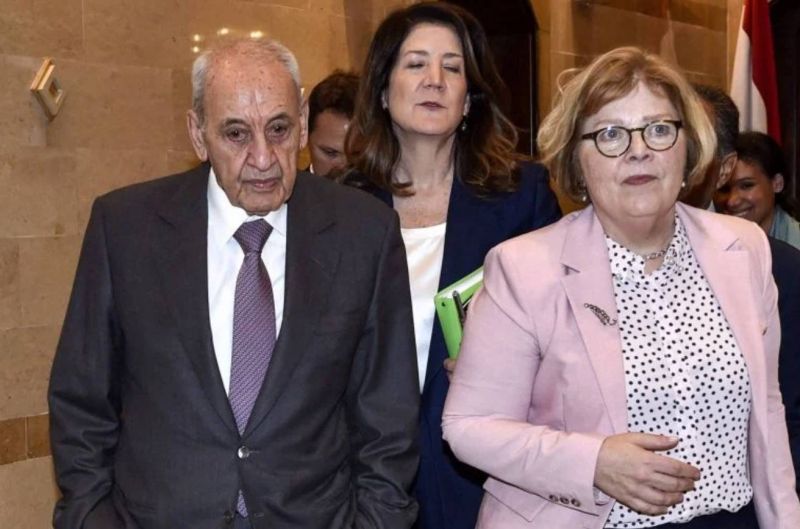
Parliament Speaker Nabih Berri received American Under-Secretary of State for the Middle East Barbara Leaf last March in Ain el-Tineh. (Credit: AFP)
In an almost unprecedented statement, US Assistant Secretary of State for Near Eastern Affairs, Barbara Leaf, warned Hezbollah against leading Lebanon down a “dangerous path” and called on the party to hand over its weapons and become a political party.
“We look forward to the Lebanese state monopolizing arms and Hezbollah becoming a political party,” she told Sky News Arabia on Thursday.
The diplomat made a similar demand to Iran, Hezbollah’s sponsor, urging it to “avoid escalation” by refraining from “arming groups in the region such as the Houthis and Hezbollah.” Leaf added that the US “has channels of communication with Iran.”
Relatively new in this stance is the possibility of Washington making a distinction between Hezbollah’s military and political branches. The US has so far refused to do so, labeling the Shiite party a terrorist organization since as far back as 1997.
The European Union and several EU member-states, particularly France, have already made this distinction. Meanwhile, the UK and Germany have not. But can Leaf’s remarks be seen as a prelude to the US administration softening its stance towards Hezbollah?
The official response was prompt. “Hezbollah remains a foreign terrorist organization and Specially Designated Global Terrorists,” said a US Embassy spokesperson in Lebanon.
“We continue to press Lebanon’s leadership to address the destabilizing role Hezbollah plays in the country and region, and ensure that its actions do not drag Lebanon into a war that its people do not want and can't afford,” the spokesperson added.
So it is not the US perception of Hezbollah that has changed, but probably its approach, which seems more like political pragmatism at a time that all-out war with Israel seems increasingly likely.
This relative openness seems to be linked to the US’ desire to prevent Lebanon from entering a war that promises to be devastating. Washington wants to ensure that Hezbollah’s actions do not drag Lebanon into a war, said Leaf.
This has led Hassan Mneimneh, a lecturer at the Middle East Institute in Washington, to say that the US administration’s sole concern at the moment is precisely to avoid a widening of the war in Lebanon.
“In Washington, there is now a conviction that Israel is determined to launch an all-out war against Lebanon, regardless of Hezbollah’s position, given that the Hebrew state has so far failed to restore its deterrence power,” since Hamas’ Oct. 7 attack, said Mneimneh.
Michael Young, editor of Diwan, echoed this point of view. He believes that the US is simply seeking “to send messages to Hezbollah and Iran, which is realistic, but this does not imply a change of attitude on the part of the Americans.”
The distinction between the two
However, for the first time since the EU made a clear distinction between the two branches of Hezbollah, Leaf’s words can be interpreted as a kind of openness, albeit virtual at this stage. She suggests the possibility that the US could perceive Hezbollah from a pure political angle one day.
It was Great Britain that introduced the concept of the two branches of Hezbollah at the end of the 90s, before abandoning it in 2019, thus joining Washington’s position.
The US itself softened its rough position somewhat since 2001, with the rise of Sunni fundamentalism and the 9/11 attacks. At the time, it was about facing a joint enemy.
However, the “political truce” did not last long, and Washington resumed its salvo of sanctions on Iran and Hezbollah soon after. Some analysts believe that this position is not about to change.
“I wouldn’t go too far in interpreting Barbara Leaf’s remarks,” said Joe Macaron, a researcher at the Wilson Center. “To say that there is no difference between Hezbollah’s two branches does not contradict the need for the latter to turn itself into a political party, from the American point of view,” Macaron said.
Leaf’s relatively measured remarks were probably intended, in Macaron’s view, to allow the negotiations of US envoy Amos Hochstein to proceed “more smoothly.”
The “relative flexibility” that Hochstein himself has shown, long before Leaf, should be interpreted in the same way. By successfully concluding the maritime border demarcation agreement between Lebanon and Israel in October 2022, Hochstein carved his position as a go-between between Israel and Lebanon in order to end the hostilities on both sides of the border.
Indeed, long before Leaf, Hochstein demonstrated flexibility by presenting a plan two weeks ago aimed at achieving a settlement in southern Lebanon. Disregarding the Israeli demand that Hezbollah withdraw its fighters and weapons to the north of the Litani River, as provided for in UN Security Council Resolution 1701, Hochstein utilized subtle language. He suggested halting visible military activities in the region while bolstering the Lebanese Army and deploying additional forces to stabilize the situation.
“Through this proposal, Hochstein has exceeded the red lines drawn by the Hebrew state,” said Young. According to sources close to Hezbollah, who don’t believe there is a change in Washington’s attitude, the party does not yet seem to take this softened position seriously.
This article was originally published in French in L'Orient-Le Jour. Translation by Joelle El Khoury.